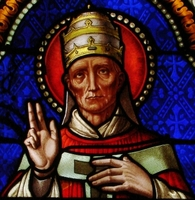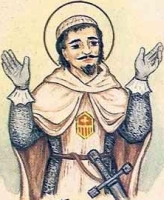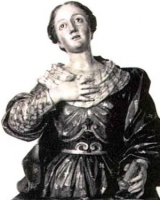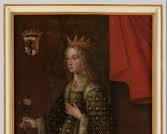St. Nemesius
புனித_நெமெசியூஸ் (-307)
டிசம்பர் 19
இவர் (#StNemesius) எகிப்திலுள்ள அலெக்சாந்திரியாவில் பிறந்தவர்.
கடவுள்மீது ஆழமான நம்பிக்கைகொண்டு வாழ்ந்த இவர், உரோமையை ஆண்டுவந்த தேசியூஸ் என்ற மன்னனின் காலத்தில் பொய்க்குற்றம் சுமத்தப்பட்டுச் சிறையில் அடைக்கப்பட்டார்.
ஒருசில நாள்களிலேயே குற்றமற்றவர் என்று நிரூபிக்கப்பட்டு வெளியே வந்த இவரைத் மன்னன் தேசியூசின் ஆள்கள் சிலர் இவர் கிறிஸ்தவர் என்று சிறைப்பிடித்துக் கடுமையாகச் சித்திரவதை செய்தனர். அந்த நிலையிலும் இவர் கிறிஸ்துவின்மீது கொண்ட நம்பிக்கையில் உறுதியாக இருந்தார்.
இதனால் கயவர்கள் இவரைத் தீயிலிட்டு எரித்துக் கொன்றுபோட்டார்கள்.
Feastday: December 19
Martyr of Egypt. He was burned alive in Alexandria, Egypt, during the persecutions under Emperor Trajanus Decius. Nemesius was arrested and scourged and then burned to death. Like Christ, he was executed between two criminals.
Pope Blessed Urban V
அருளாளர் திருத்தந்தை 5ம் அர்பன்
200வது திருத்தந்தை:
ஆறாவது அவிக்னான் திருத்தந்தை:
பிறப்பு: கி.பி. 1310
கிரிஸாக், லான்குடோக், ஃபிரான்ஸ் அரசு
இறப்பு: டிசம்பர் 19, 1370 (வயது 60)
அவிக்னான், திருத்தந்தையர் மாநிலங்கள்
ஏற்கும் சமயம்:
ரோமன் கத்தோலிக்க திருச்சபை
முக்திபேறு பட்டம்: மார்ச் 10, 1870
திருத்தந்தை ஒன்பதாம் பயஸ்
நினைவுத் திருநாள்: டிசம்பர் 19
பாதுகாவல்:
கட்டிட கலைஞர் (Architects), கல்வியாளர்கள் (Educators), ஆசீர்வாதப்பர் சபைத் துறவியர் (Benedictines), மறைப்பணியாளர்கள் (Missionaries)
"கில்லௌம் டி க்ரிமோர்ட்" (Guillaume de Grimoard) எனும் இயற்பெயர் கொண்ட திருத்தந்தை அருளாளர் ஐந்தாம் அர்பன், கத்தோலிக்க திருச்சபையின் திருத்தந்தையாக கி.பி. 1362ம் ஆண்டு, செப்டம்பர் மாதம், 28ம் நாள் முதல், கி.பி. 1370ம் ஆண்டில் தமது மரணம்வரை ஆட்சி செய்தவர் ஆவார். பெனடிக்டைன் (Order of Saint Benedict) சபையைச் சேர்ந்த இவர், அன்றைய “ஆர்ல்” (Kingdom of Arles) அரசின், (தற்போதைய ஃபிரான்ஸ்) “அவிக்னான்” எனுமிடத்திலிருந்து ஆட்சி செய்த ஏழு திருத்தந்தையரில் ஆறாவது திருத்தந்தை (Sixth Avignon Pope) ஆவார்.
இவர் பேரறிஞராகவும், புனிதராகவும் பலராலும் போற்றப்பட்டவர். திருத்தந்தையாக தேர்வான பின்பும் இவர் பெனடிக்டைன் சபை சட்டங்களைப் பின்பற்றி எளிய வாழ்வு வாழ்ந்தார். திருத்தந்தை ஒன்பதாம் பயஸ், கி.பி. 1870ம் ஆண்டு, இவருக்கு அருளாளர் பட்டம் அளித்தார். “அவிக்னான்” எனுமிடத்திலிருந்து ஆட்சிசெய்த ஏழு திருத்தந்தையருள் முக்திபேறு பட்டம் பெற்ற ஒரே திருத்தந்தை இவர் ஆவார்.
இவர் தமது ஆட்சிக்காலத்தில் திருச்சபையினைச் சீரமைக்க முயன்றார். பல ஆலயங்களையும் மடங்களையும் புதுப்பித்தார். இவர் தமது ஆட்சிப்பொறுப்பை ஏற்கும்போது கொண்ட குறிக்கோளான, பிரிந்து சென்ற இருபெரும் கிழக்கத்திய மற்றும் மேற்கத்திய திருச்சபைகளை (Eastern and Western Churches) ஒன்றிணைக்க பெரிதும் முயன்றார். ஆயினும் இவரின் முயற்சி பலனளிக்கவில்லை.
கி.பி. 1310ம் ஆண்டு, அப்போதைய ஃபிரான்ஸ் பிராந்தியத்தில் பிறந்த இவரது தந்தை, “பெல்லேகார்ட்” (Lord of Bellegarde) என்ற குறுநில பிரபு ஆவார். இவரது தாயாரின் பெயர் “அம்ஃபெலிஸ்” (Amphélise de Montferrand) ஆகும். இவருக்கு, “எட்டியேன்” (Étienne) மற்றும் பின்னாளைய கர்தினால் “ஆங்கிலிக்” (Anglic), எனும் இரண்டு சகோரர்களும், “டெல்ஃபின்” (Delphine) என்றொரு சகோதரியும் இருந்தனர்.
தமது பதினேழாம் வயதில், தமது ஊரிலேயே அமைந்துள்ள சிறு துறவிகள் மடத்தில் பெனடக்டைன் (Benedictine monk) துறவியாக இணைந்தார். கி.பி. 1334ம் ஆண்டு குருத்துவ அருட்பொழிவு பெற்ற இவர், இலக்கியமும் சட்டமும் பயின்றார். கி.பி. 1342ம் ஆண்டு, அக்டோபர் மாதம், 31ம் தேதி, "கிறிஸ்தவச் சமயச் சட்டத்தின்" மறைவல்லுனர் (Doctorate in Canon Law) பட்டம் வென்றார்.
கி.பி. 1362ம் ஆண்டு, திருத்தந்தை “ஆறாம் இன்னொசென்ட்” (Pope Innocent VI) அவர்களின் மரணத்தின்பின் நடந்த தேர்தலில் வெற்றி பெற்ற "கில்லௌம் டி க்ரிமோர்ட்" திருத்தந்தையாக “ஐந்தாம் அர்பன்” என்ற பெயரை ஏற்றார். மிகவும் எளிய வாழ்வினை வாழ்ந்த திருத்தந்தை ஐந்தாம் அர்பன், கி.பி. 1370ம் ஆண்டு, டிசம்பர் மாதம், 19ம் நாள், மரணமடைந்தார்.
Also known as
• Guillaume de Grimoard
• Urbanus V
Profile
Born to the nobility, one of four children of Guillaume de Grimoard, Lord of Bellegarde, and of Amphélise de Montferrand; his brother later became a cardinal and papal legate. Guillaume became a Benedictine monk at the priory of Chirac, France in 1327. Priest, ordained at the Chirac monastery in 1334. He studied literature and law in Montpellier, France, and then law at the University of Toulouse, France. He received a doctorate in Canon Law on 31 October 1342, and was known as one of the most learned men of his day. Appointed prior of Nôtre-Dame du Pré in the diocese of Auxerre, France by Pope Clement VI. Abbot of Saint-Germain en Auxerre monastery on 13 February 1352. Benedictine Procurator-General at the Papal court. Taught canon law in Montpellier, in Paris and in Avignon, France. Vicar-general of the diocese of Clermont, France c.1350. Vicar-general of the diocese of Uzès, France in 1357. Served as papal legate in Italy several times. Abbot of the abbey of Saint Victor in Marseilles, France from August 1361 to 1362. Advisor to Pope Innocent VI. Apostolic Nuncio in Italy.
Sixth of the Avignon Popes; he took the name Urban saying that "all the popes who have borne this name were saints". As pope he eschewed the pomp of the throne, and continued to live by the Benedictine Rule, which led to opposition from courtiers who preferred a more regal life in court. He cut tithes in half, supported students, clerical training, seminaries and colleges, worked to re-unite Latin and Greek Christians, fought the heresies of the day, built churches and monasteries, restored many that had fallen on hard times or fallen away from discipline. He fought absentee bishops, bishops of multiple dioceses, and simony, founded a university in Hungary, restored the medical school in Montpellier, and approved the establishment of the University of Krakow. He preached crusade against the Viscontis in Italy, accusing them of theft of Church property. Preached crusade against the Turkes in 1363, but little came of it as many of the leaders died of natural causes before troops could be put into the field. Urged by Saint Bridget of Sweden and by Saint Catherine of Siena to return the papacy to Rome, he moved his court back to Rome, entering the city on 16 October 1367, the first pope to do so in 60 years. He was met by jubilant Romans and clergy. He re-discovered relics of Saint Peter and Saint Paul the Apostle in the papal chapel of the Lateran basilica when he prepared to say Mass there on 1 March 1368; they were later placed and new reliquaries and enshrined. However, outbreaks of plague and violence in the city led him to return to France, arriving there on 24 September 1370. He fell ill soon after, and his remaining weeks were ones of physical decline.
Born
1310 Grizac Castle, Languedoc, France as Guillaume de Grimoard
Papal Ascension
• elected on 28 September 1362
• consecrated on 6 November 1362
Died
• 19 December 1370 at Avignon, Papal States (in modern France) of natural causes
• interrred in the chapel of John XXII in the cathedral of Sante Marie de Domps in Avignon
• relics moved to the abbey church of Saint-Victor in Marseille, France on 31 May 1371 where they were interred in a tomb Urban built for himself
Beatified
• Cause opened by Pope Gregory XI, and many miracles were documented through Urban’s intervention, but the process ground to a halt when the papacy returned to Rome, Italy, and the Cause of an Avignon Pope was a low priority
• 10 March 1870 by Pope Pius IX (cultus confirmation)
Blessed William of Fenoli
Also known as
Guglielmo, Gulielmus
Additional Memorial
16 December (Carthusians)
Profile
Hermit in the Torre Mondovi region. Carthusian lay-brother at the Charterhouse of Casularum, Lombardy, Italy where he managed the house's external affairs. He was wholly un-learned in theology, philosophy or the ways of the world aside from his assigned duties, but in spiritual life and good works he was considered a saint in life.
One day when coming in from the fields, William was attacked by thieves, and defended himself by tearing the leg off his donkey and using it as a club to drive off the attackers; afterways he re-attached the leg, and the pair continued home.
Born
1065 in Garessio-Borgoratto, Diocese of Mondovi, Italy
Died
c.1120 in Casotto, Italy of natural causes
Beatified
29 March 1860 by Pope Pius IX (cultus confirmation)
Saint Bernard Valeara of Teramo
Also known as
• Bernard Paleara
• Bernard Pagliara
• Bernhard, Berard, Bernardo, Berardo
Profile
Born to the nobility; brother of Blessed Colomba of Mount Brancastello. Benedictine monk at Monte Cassino abbey. Priest Bishop of Teramo, Italy in 1115. Known as a zealous reformer, evangelist, and for his charity.
Born
c.1050 in the castle of Pagliara near Castelli, Isola del Gran Sasso, Teramo, Abruzzo, Italy
Died
• 19 December 1122 of natural causes
• buried in the chapel of Saint Anne in the Old Cathedral of Teramo, Italy
• relics transferred to the new cathedral in 1174
• relics transferred to a chapel devoted to Saint Bernard in 1776
Blessed Kazimiera Wolowska
Also known as
• Kasimir Wolowska
• Maria Marta Wolowska
• Maria Marta of Jesus
• Mary Martha of Jesus
• Maria Marta of Gesù Wolowska
Additional Memorial
12 June as one of the 108 Martyrs of World War II
Profile
Member of the Sisters of the Immaculate Conception of the Blessed Virgin taking the name Maria Marta of Jesus. Prioress of the convent in Slonim, Belarus. Fed, sheltered, hid and taught Jews during the Nazi persecutions. Imprisoned and executed for this work. Martyr.
Born
30 September 1879 in Lublin, Lubelskie, Poland as Kazimiera Wolowska
Died
19 December 1942 in Slonim, Minskaya voblasts', Belarus
Beatified
13 June 1999 by Pope John Paul II in Warsaw, Poland
Blessed Bogumila Noiszewska
Also known as
• Maria Eva Noiszewska
• Maria Ewa of Providence
• Maria Ewa od Opatrznosci
Additional Memorial
12 June as one of the 108 Martyrs of World War II
Profile
Member of the Sisters of the Immaculate Conception of the Blessed Virgin, taking the name Maria Ewa of Providence. School teacher in Slonim, Belarus. Imprisoned and executed by Nazis for helping to hide Jews. Martyr.
Born
11 June 1885 in Uzumiskiai, Vilniaus rajonas, Lithuania as Bogumila Noiszewska
Died
19 December 1942 in Slonim, Minskaya voblasts', Belarus
Beatified
13 June 1999 by Pope John Paul II in Warsaw, Poland
Saint Stêphanô Nguyen Van Vinh
Also known as
Stephen Nguyen Van Vinh
Additional Memorial
24 November as one of the Martyrs of Vietnam
Profile
Layman farmer in the apostolic vicariate of East Tonkin (in modern Vietnam). Convert. Dominican tertiary. Imprisoned, tortured and executed for his faith in the persecutions of emperor Minh Mang. Martyr.
Born
c.1813 in Phú Trang, Nam Ðanh, Vietnam
Died
strangled to death on 19 December 1839 in Co Me, Bac Ninh, Vietnam
Canonized
19 June 1988 by Pope John Paul II
Saint Phanxicô Xaviê Hà Trong Mau
Also known as
Francis Xavier Mau
Additional Memorial
24 November as one of the Martyrs of Vietnam
Profile
Lay Dominican in the apostolic vicariate of East Tonkin. Catechist. Imprisoned, tortured and executed for his faith in the persecutions of emperor Minh Mang. Martyr.
Born
c.1790 in Ke Rien, Thái Bình, Vietnam
Died
strangled to death on 19 December 1839 in Co Me, Bac Ninh, Vietnam
Canonized
19 June 1988 by Pope John Paul II
Saint Augustine Moi Van Nguyen
Also known as
Augustinô Nguyen Van Moi
Additional Memorial
24 November as one of the Martyrs of Vietnam
Profile
Poor day labourer. Lay Dominican tertiary in the apostolic vicariate of East Tonkin. Catechist. Ordered by government authorities to trample a cross to show his renunciation of the faith; he declined. Martyr.
Born
c.1806 in Phú Trang, Nam Ðinh, Vietnam
Died
strangled in 1839
Canonized
19 June 1988 by Pope John Paul II
Saint Tôma Nguyen Van Ðe
Also known as
Thomas De
Additional Memorial
24 November as one of the Martyrs of Vietnam
Profile
Layman tailor in the apostolic vicariate of East Tonkin (in modern Vietnam. Dominican tertiary. Arrested for sheltering foreign missionaries. Martyred with four other Vietnamese Catholics.
Born
c.1811 in Bo Trang, Nam Ðinh, Vietnam
Died
strangled to death on 19 December 1839 in Co Me, Bac Ninh, Vietnam
Canonized
19 June 1988 by Pope John Paul II
Pope Saint Anastasius I
புனிதர் முதலாம் அனஸ்தாசியஸ்
39ம் திருத்தந்தை:
பிறப்பு: தெரியவில்லை
இறப்பு: டிசம்பர் 19, 401
ரோம் (Rome)
ஏற்கும் சமயம்:
ரோமன் கத்தோலிக்க திருச்சபை
ஆட்சி தொடக்கம்: நவம்பர் 27, 399
ஆட்சி முடிவு: டிசம்பர் 19, 401
நினைவுத் திருநாள்: டிசம்பர் 19
திருத்தந்தை முதலாம் அனஸ்தாசியஸ் (Pope Anastasius I) கத்தோலிக்க திருச்சபையில் உரோமை ஆயராகவும், திருத்தந்தையாகவும் கி.பி. 399ம் ஆண்டு, நவம்பர் 27ம் தேதிமுதல், கி.பி. 401ம் ஆண்டு, டிசம்பர் 19ம் தேதிவரை ஆட்சிசெய்தார். இவர் கத்தோலிக்க திருச்சபையின் 39ம் திருத்தந்தை ஆவார்.
வரலாற்றுக் குறிப்புகள்:
திருத்தந்தை முதலாம் அனஸ்தாசியஸ் திருச்சபையின் தலைமைப் பதவியை ஏற்பதற்கு முன், திருத்தந்தையாக இருந்தவர் "சிரீசியஸ்" (Pope Siricius) ஆவார். அனஸ்தாசியஸ் திருத்தந்தையாகத் தேர்ந்தெடுக்கப்படுமுன் அவருக்கு ஒரு மகன் இருந்தார். அவர் அனஸ்தாசியசின் மரணத்தின்பின் திருத்தந்தையாகத் தேர்ந்தெடுக்கப்பட்டு, "முதலாம் இன்னசெண்ட்" (Pope Innocent I) என்னும் பெயரைச் சூடிக்கொண்டார்.
இறையியலார் ஓரிஜென் கண்டனம் செய்யப்படுதல்:
திருத்தந்தை முதலாம் அனஸ்தாசியஸ் வரலாற்று முக்கியத்துவம் பெறுவதற்கு ஒரு காரணம், அவர் கி.பி. 2-3 நூற்றாண்டுக் காலத்தில், "அலெக்ஸ்சாண்ட்ரியாவில்" (Alexandria) வாழ்ந்த “ஓரிஜென்” (Origen) என்னும் தலைசிறந்த இறையியலார் கிரேக்கத்தில் எழுதிய இறையியல் நூல் இலத்தீனில் (Latin) மொழிபெயர்க்கப்பட்டதும், அது தப்பறையான கொள்கைகளை உள்ளடக்கியதாகக் கருதப்பட்டதால் அவரைக் கண்டனம் செய்ததும் ஆகும்.
தவறான கொள்கைகள் கண்டிக்கப்படல்:
முதலாம் அனஸ்தாசியஸ் காலத்தில், கிறித்தவ மதம் துன்புறுத்தப்பட்ட பின்னணியில், தம் மதத்தை மறுத்து உரோமை அரசனுக்குப் பணிந்த கிறித்தவர்கள், தங்கள் தவற்றினை ஏற்று மீண்டும் கிறித்தவத்துக்குத் திரும்ப விரும்பினார்கள். அவர்கள் மீண்டும் ஏற்பது குறித்தும், அவர்களுக்கு மீண்டும் திருமுழுக்கு அளிக்க வேண்டுமா - வேண்டாமா என்பது குறித்தும் சர்ச்சை தொடர்ந்து நிகழ்ந்தது. "டொனாட்டிய" (Donatism) கொள்கை, அவர்களுக்கு மறு-திருமுழுக்கு அளிக்க வேண்டும் என்று வாதாடியது. அவர்களை மீண்டும் சபையில் ஏற்பது குறித்த நிபந்தனைகளைத் தளர்த்த வேண்டும் என்று ஆப்பிரிக்க ஆயர்கள் சிலர் கேட்டனர். அதற்கு, திருத்தந்தை அத்தனாசியஸ், கார்த்தேஜ் சங்கத்திற்கு (கி.பி. 401ம் ஆண்டு) எழுதிய கடிதத்தில் பதில் அளித்தார்.
திருத்தந்தையின் ஆதரவாளர்கள்:
முதலாம் அனஸ்தாசியசுக்கு ஆதரவு அளித்தவர்களுள் புனிதர் ஜெரோம் (St. Jerom), புனிதர் நோலா பவுலீனுஸ் (St. Paulinus of Nola), ஆகியோர் முக்கியமானவர்கள். அவ்விருவரும் அனஸ்தாசியசுக்கு முன் திருத்தந்தையாக இருந்த சிரீசியசின் செயல்பாடுகளை விமர்சித்திருந்தனர் என்பது குறிப்பிடத்தக்கது.
தொடக்க கால மேலைத் திருச்சபையின் தலைசிறந்த இறையியலராகக் கருதப்படும் புனிதர் அகுஸ்தீன் (St. Augustine) (கி.பி. 354-430) திருத்தந்தை அனஸ்தாசியஸ் தப்பறைக் கொள்கைகளைக் கடிந்துகொண்டதைப் பாராட்டியுள்ளார். மேலும் அவர் அனஸ்தாசியசின் நண்பராகவும் திகழ்ந்தார்.
இறப்பும் திருவிழாவும்:
திருத்தந்தை முதலாம் அத்தனாசியஸ் கி.பி. 401ம் ஆண்டு, டிசம்பர் மாதம், 19ம் நாளன்று, இறந்தார். அவரது உடல் உரோமையில் "போர்த்துவேன்சிசு" சாலையில் அமைந்த "போன்ந்தியன் கல்லறைத் தோட்டத்தில்" (Catacomb of Pontian) அடக்கம் செய்யப்பட்டது.
அவரது நினைவுத் திருவிழா, டிசம்பர் மாதம், 19ம் நாள் கொண்டாடப்படுகிறது.
Profile
All that is known of his early life is that he was considered pious as a youth, and cared nothing for material things as an adult. Pope. Immediately involved in the turmoil resulting from the heretical writings of Origen. Convened a synod to condemn the works. Fought against the heresy of Donatism. Friend of Saint Augustine of Hippo, Saint Jerome, and Saint Paulinus of Nola.
Born
4th century in Rome, Italy
Papal Ascension
27 November 399
Died
402 of natural causes
Blessed Konrad Liechtenau
Profile
Born to the noblity, member of the family of the Count of Liechtenau, Baden-Wuerttemberg, Germany. Canon of the cathedral of Konstanz, Germany. Premonstratensian monk. Canon of the Ursberg monastery at Augsburg, Germany. Priest. Abbot of Ursberg in 1226. He renovated the abbey and greatly expanded the library, making it a center to learning; he devoted his free time to historical research. Friend and advisor to emperor Frederick II. Wrote 12 volumes on the Saints.
Born
late 12th century Germany
Died
1240
Blessed Cecilia of Ferrara
Also known as
Caecilia
Profile
Married to a very pious young man, each was devoted to the Church and spiritual growth. After eight years together they each entered religious life, joining the Dominicans, Cecilia at the monastery of Saint Catherine the Martyr in Ferrara, Italy where she was known for her personal piety, ascetic life, and devotion to the Dominican life. Chosen prioress three times.
Born
15th century Italy
Died
• late December 1511
• miracles reported at her grave
Blessed Berengar de Banares
Profile
Soldier. Knight. Mercedarin, received into the Order by Saint Peter Nolasco. Sent to Algiers in 1240 where he ransomed 87 Christian slaves and brought them back to Barcelona, Spain. He later retired to live as a Mercedarian monk at the convent of Sant Antonio Abate, Tarragona, Spain.
Died
13th century in Tarragona, Spain of natural causes
Saint Dominic Uy Van Bui
Additional Memorial
24 November as one of the Martyrs of Vietnam
Profile
Catechist. Arrested for his faith, he was ordered to repudiate Christianity; he refused. Martyr.
Born
1813 in Vietnam
Died
strangled to death in 1839 in Vietnam
Canonized
19 June 1988 by Pope John Paul II
Blessed John Gogniat
Also known as
John of Bellelay
Profile
Premonstratensian monk. Canon of the Bellelay monastery in the Jura Bernois area of Bern, Switzerland. Abbot of the house in 1530; he served for 23 years, defending his house and his faith during a period when Calvinists displacing Catholic clergy and institutions.
Born
late 15th century
Died
19 December 1553 of natural causes
Saint Manirus of Scotland
Also known as
Manire, Monire, Miniar, Niniar
Profile
Missionary bishop to the Highlanders of northern Scotland. Had an on-going battle of words and ideas with the local pagans, but there was apparently little violence from either side during his work.
Born
c.700 in Scotland
Died
824 in Scotland of natural causes
Saint Fausta of Sirmium
Profile
Born to the nobility. Married, and the mother of Saint Anastasia of Sirmium; her personal piety helped form her own faith. Widow.
Died
late 3rd century in Rome, Italy of natural causes
Saint Meuris of Alexandria
Profile
Virgin who dedicated herself to God. Arrested, tortured and martyred for her faith in the persecutions of Maximinus II.
Born
Gaza, Palestine
Died
tortured to death in 307 in Alexandria, Egypt
Saint Thea of Alexandria
Profile
Virgin who dedicated herself to God. Arrested, tortured and martyred for her faith in the persecutions of Maximinus II.
Born
Gaza, Palestine
Died
tortured to death in 307 in Alexandria, Egypt
Saint Boniface of Cilicia
Profile
Slave and servant to the imperial Roman noble woman Aglaia at Tarsus, Cilicia. Martyred in the persecutions of Diocletian.
Died
c.290 in Tarsus, Cilicia (in modern Turkey)
Saint Timothy the Deacon
Also known as
• Timothy of Africa
• Timoteus
Profile
Deacon. Martyred in the persecutions of Decius.
Died
burned alive c.250 in North Africa
Saint Ribert of Saint-Oyend
Also known as
Ribarius
Profile
Monk. Abbot of the monastery of Saint Oyend, France.
Died
c.790 of natural causes
Saint Avitus of Micy
Also known as
Adjutus, Avit, Avy
Profile
Abbot of Saint-Mesmin de Micy Abbey near Orleans, France. Had the gift of prophecy.
Saint Gregory of Auxerre
Profile
Bishop of Auxerre, France for 13 years.
Born
c.455
Died
c.540 of natural causes
Blessed Mercedarian Fathers
Profile
A group of Mercedarian monks noted for their dedication to the Order's rule, for their continuous prayer life, and their personal piety.
• Blessed Bartolomeo of Podio
• Blessed Giovanni of Verdera
• Blessed Guglielmo de Gallinaris
• Blessed Guglielmo of Prunera
• Blessed Pietro of Benevento
• Blessed Pietro of Gualba
Martyrs of Nicaea
Profile
A group of Christians martyred together. The only surviving details are four of their names - Darius, Paul, Secundus and Zosimus.
Died
at Nicaea, Bithynia (modern Izmit, Turkey)
Martyrs of Nicomedia
Profile
A group of Christians martyred together in the persecutions of Diocletian. We know little more than the names of five - Anastasius, Cyriacus, Paulillus, Secundus and Syndimius.
Died
303 at Nicomedia, Asia Minor
Martyred in the Spanish Civil War
• Blessed Jaume Boguñá Casanovas
• Blessed Jordi Sampé Tarragó
• Blessed Josep Albareda Ramoneda
Adelaide of Susa
Adelaide of Susa (c. 1014/1020 – 19 December 1091), also known as Adelaide of Turin, was the last of the Arduinici dynasty and a powerful figure in 11th-century Italy. Throughout her life, she held the titles of Countess of Savoy, Marchioness of Turin, and Regent of Savoy.
Early life
Born in Turin to Ulric Manfred II of Turin and Bertha of Milan, Adelaide's early life is not well documented. However, it is believed that she received a thorough education, including training in martial arts. This training likely contributed to her reputation as a strong and capable woman.
Marriages and children
In 1037, Adelaide married Herman IV, Duke of Swabia. However, this marriage was short-lived as Herman died the following year. In 1046, Adelaide married Otto, Count of Savoy. This marriage proved to be more successful and resulted in the birth of five children, including Peter I, Count of Savoy, and Amadeus II, Count of Savoy.
Rise to power
After her husband's death in 1057/1060, Adelaide ruled the March of Turin and the County of Savoy alongside her sons. She proved to be a skilled and determined ruler, expanding her territories and defending them against numerous challenges.
Legacy
Adelaide of Susa is remembered as one of the most powerful women in 11th-century Italy. She was a skilled politician, a military leader, and a patron of the arts. Her legacy includes the expansion of the County of Savoy and the strengthening of the Arduinici dynasty. She is sometimes compared to her second cousin and close contemporary, Matilda of Tuscany.
Here are some additional facts about Adelaide of Susa:
She was described as a beautiful woman with the soul of a lion.
She was known for her intelligence, wisdom, and courage.
She played a key role in the Investiture Controversy.
She founded several monasteries and churches.
She is considered a saint by the Catholic Church.
















No comments:
Post a Comment